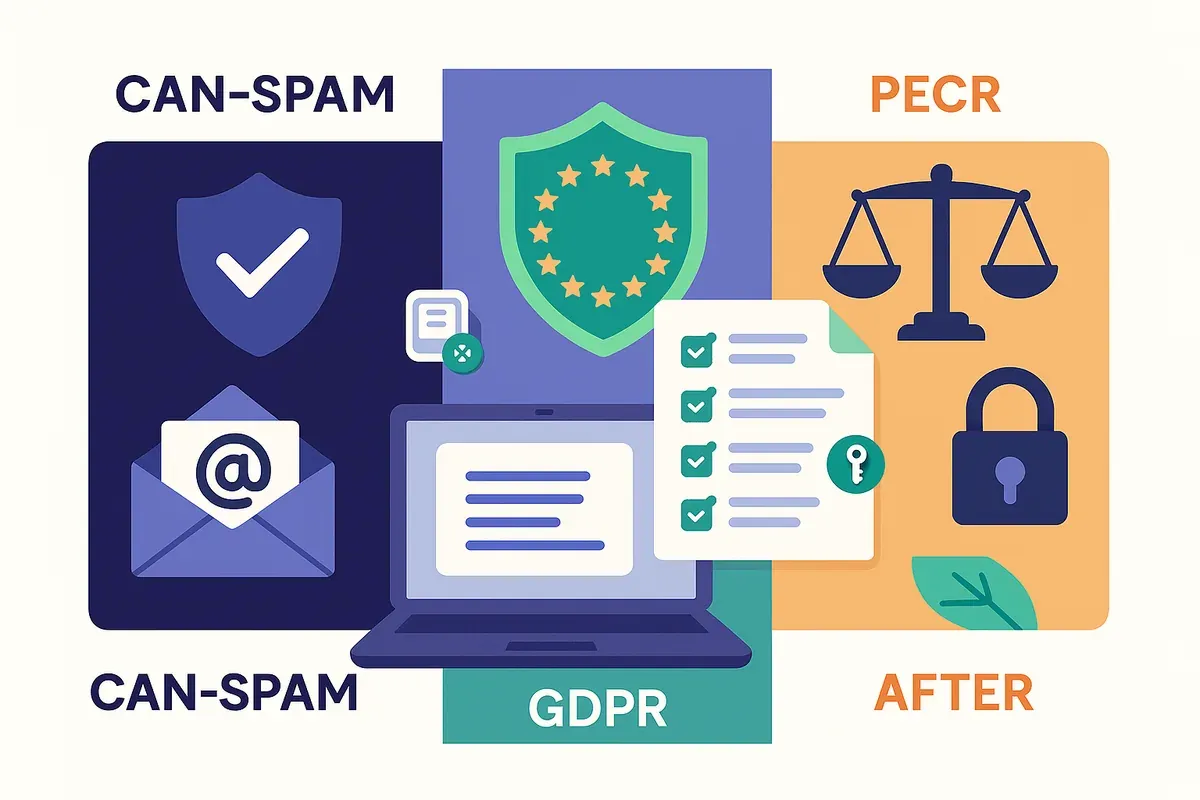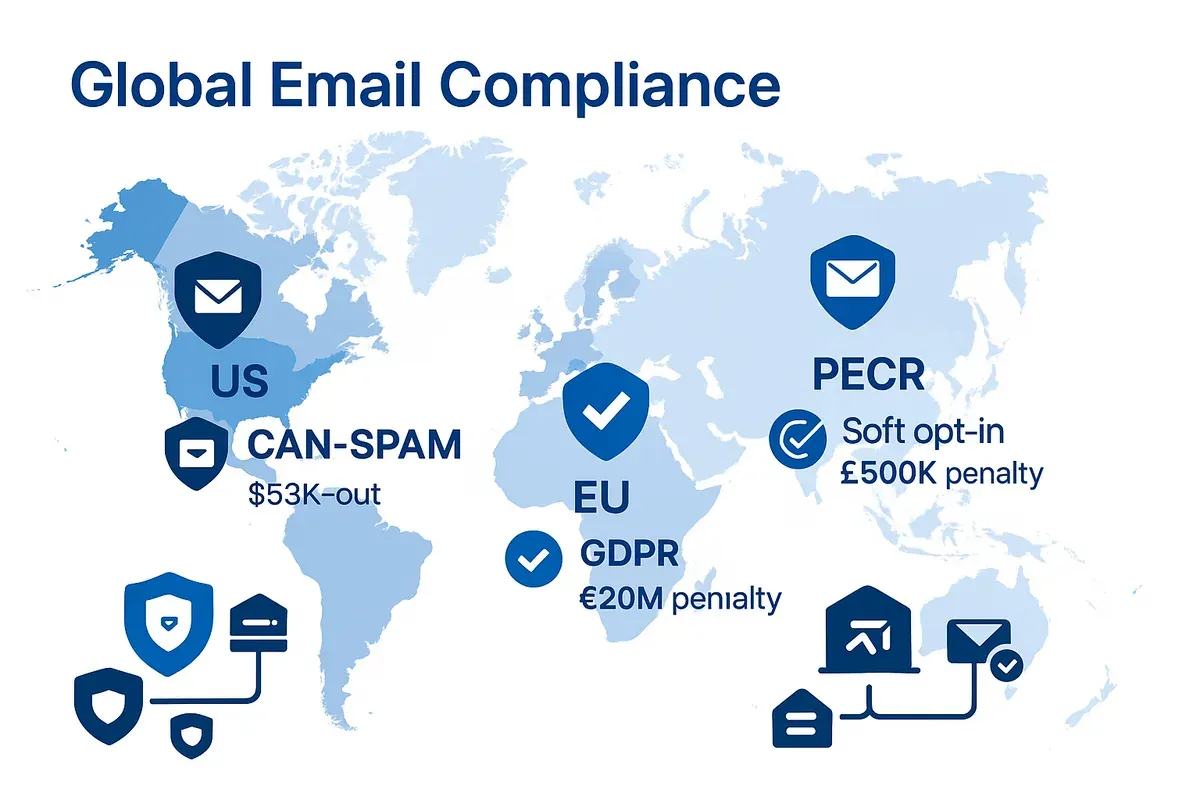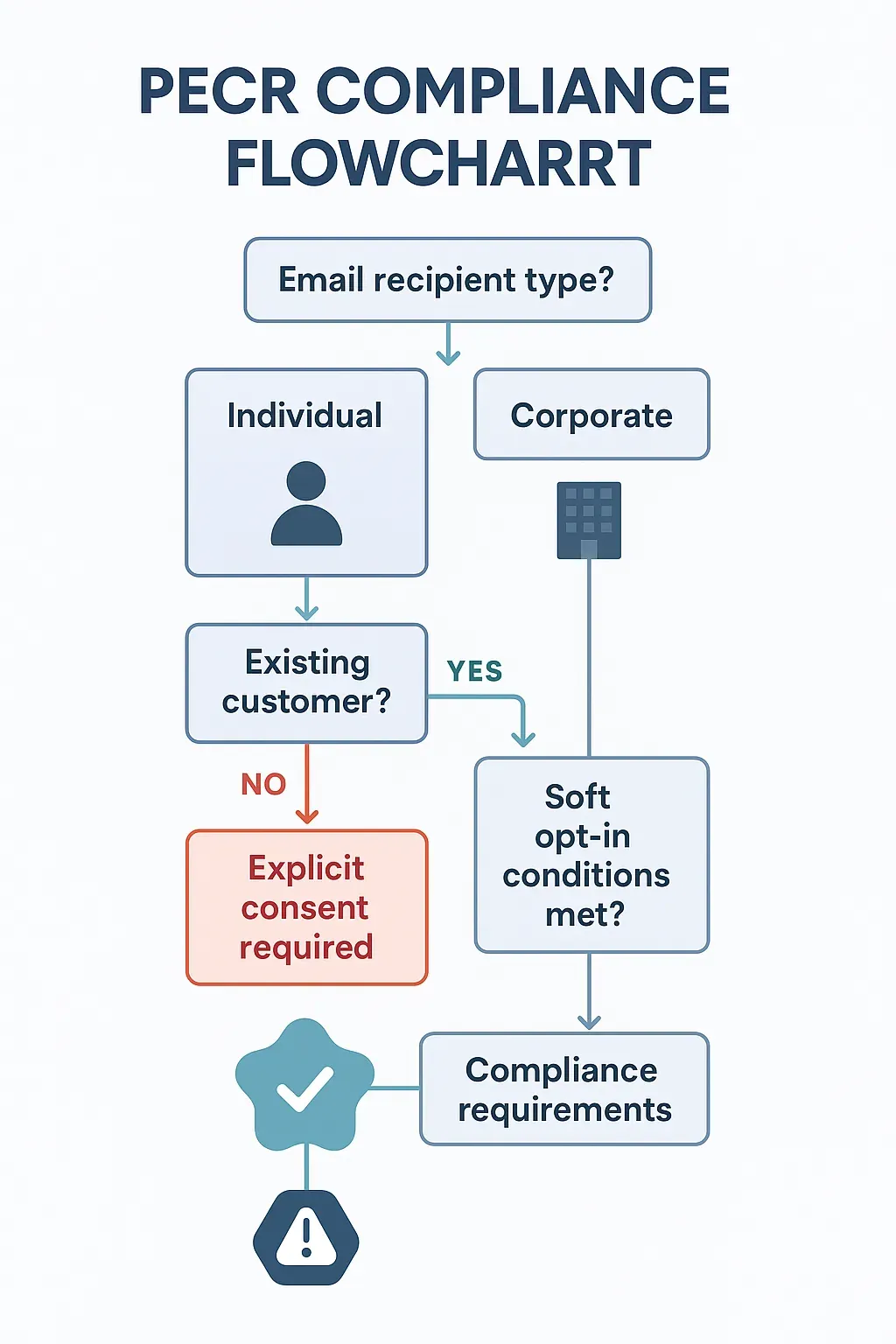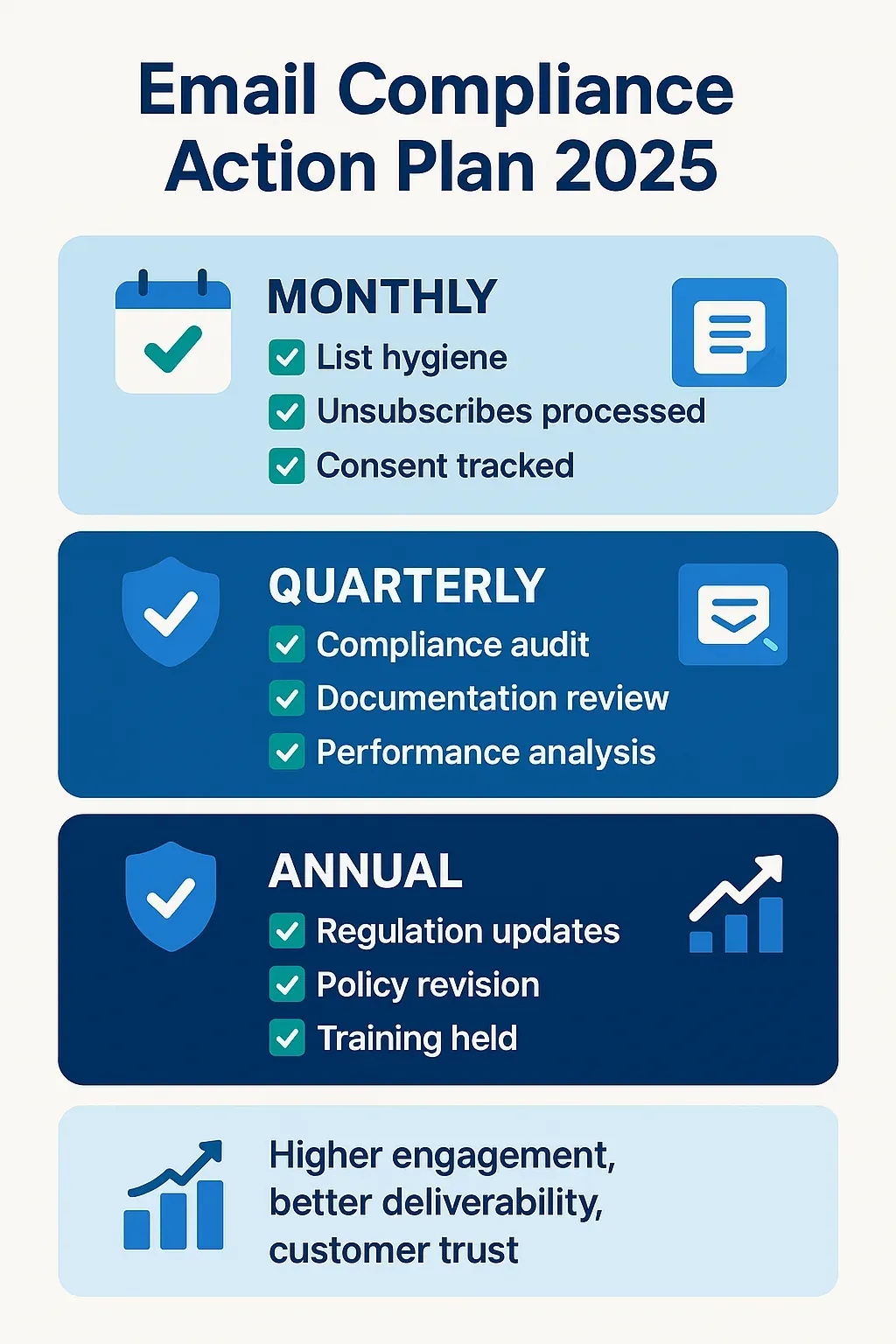Email Marketing Compliance Guide: Master CAN-SPAM, GDPR & PECR in 2025
Master email marketing compliance in 2025 with proven strategies. Complete guide covering CAN-SPAM, GDPR, PECR requirements and best practices.

Email marketing drives incredible results—but one compliance misstep can cost your business thousands in fines and damage your reputation forever. We've seen too many companies stumble into legal trouble because they didn't understand the complex web of regulations governing commercial emails.
The landscape has dramatically shifted since GDPR transformed the industry in 2018, followed by strengthened CAN-SPAM enforcement and evolving PECR requirements. Today's marketers face a challenging reality: according to the Federal Trade Commission's CAN-SPAM compliance guide, each separate email violation can result in penalties of up to $53,088, while GDPR enforcement data shows fines can reach €20 million or 4% of global annual turnover.
Yet email marketing remains incredibly powerful. Research from Statista's comprehensive email marketing analysisshows the average expected ROI is $42 for every $1 spent on email marketing, and more than half of marketers in Europe and the United States report that AI has made email marketing more effective than traditional approaches. But this success hinges entirely on staying compliant while reaching the right people with the right message.
At Groupmail, we've built our platform to help businesses navigate these compliance challenges while maximizing their email marketing effectiveness. Our drag-and-drop email builder includes built-in compliance tools, and our AI subject line generator helps create engaging content that follows best practices.
💰 Business Impact: According to ResearchGate's study on data privacy laws, companies that proactively adapted to privacy regulations by investing in robust data protection measures experienced enhanced consumer engagement and brand loyalty
TL;DR - Key Takeaways:
- Global compliance is mandatory: CAN-SPAM (US), GDPR (EU), and PECR (UK) all have severe financial penalties for violations
- Consent requirements vary: US follows opt-out model, while EU/UK require explicit opt-in consent for most marketing emails
- Documentation is crucial: Keep detailed records of consent, unsubscribe requests, and all compliance measures
- Geographic targeting matters: Different laws apply based on where your recipients are located, not where you're sending from
- Proactive compliance pays off: Businesses following strict compliance standards see higher engagement and customer trust
What is Email Marketing Compliance?
Quick Answer: Email marketing compliance involves following all legal requirements for commercial emails, including obtaining proper consent, providing clear unsubscribe options, and respecting recipient privacy rights. Compliance varies by geography but focuses on protecting consumers from unwanted communications.
Email marketing compliance encompasses the legal, technical, and ethical standards governing commercial email communications. It's not just about avoiding fines—it's about building trust with your audience and ensuring your messages reach their intended recipients.
The regulatory landscape includes three major frameworks that most businesses encounter. According to HubSpot's email marketing statistics, 31% of marketers use email marketing, making compliance understanding essential for business success:
| Regulation | Geographic Scope | Key Requirement | Maximum Penalty |
|---|---|---|---|
| CAN-SPAM | United States | Clear unsubscribe options | $53,088 per email |
| GDPR | European Union | Explicit consent required | €20M or 4% revenue |
| PECR | United Kingdom | Consent or soft opt-in | £500,000 |
At the core, compliance means respecting your recipients' choices and being transparent about your intentions. As the UK ICO's electronic mail marketing guidance states, you must not send marketing emails or texts to individuals without specific consent, with limited exceptions for existing customers under "soft opt-in" rules.
Ready to implement this? Try Groupmail's drag-and-drop builder free—unlimited sending included with built-in compliance features.

CAN-SPAM Act Requirements (United States)
Quick Answer: The CAN-SPAM Act requires commercial emails to include truthful header information, clear subject lines, sender identification, physical address, and easy unsubscribe options. Email marketing compliance under CAN-SPAM follows an opt-out model where recipients can request removal after receiving emails.
The Controlling the Assault of Non-Solicited Pornography and Marketing Act (CAN-SPAM) applies to all commercial messages, including business-to-business emails. The Federal Trade Commission's comprehensive CAN-SPAM guideoutlines seven core requirements that protect your business from significant financial penalties.
CAN-SPAM's Seven Key Requirements:
- Don't use false or misleading header information - Your "From," "To," and routing information must accurately identify who sent the message
- Don't use deceptive subject lines - Subject lines must accurately reflect the email's content
- Identify the message as an advertisement - Make it clear the message is promotional
- Tell recipients where you're located - Include your valid physical postal address
- Tell recipients how to opt out - Provide a clear, easy way to unsubscribe
- Honor opt-out requests promptly - Process unsubscribes within 10 business days
- Monitor what others do on your behalf - You're responsible for third-party senders
The Federal Trade Commission enforces CAN-SPAM and has been increasingly active in enforcement. According to SendGrid's email deliverability best practices, we recommend all users familiarize themselves with the email requirements outlined in the CAN-SPAM act, particularly around unsubscribe mechanisms.
Business-to-Business Considerations:
Unlike GDPR, CAN-SPAM applies equally to B2B and B2C communications. This means your sales outreach, partnership emails, and professional newsletters must all comply with these requirements.
For businesses using Groupmail's campaign analytics, we automatically include compliant unsubscribe links and help you track opt-out requests to ensure timely processing.
🔒 Compliance Tip: According to SendGrid's deliverability documentation, maximum company visibility helps as well. Placing your company name in the subject line of your emails and including your physical mailing address and phone number in your email footers helps mail providers recognize you as a legitimate company
GDPR Requirements for Email Marketing (European Union)
Quick Answer: GDPR requires explicit, freely given consent for email marketing to EU residents. Email marketing compliance under GDPR means obtaining clear permission before sending promotional emails, providing transparent privacy information, and honoring all data subject rights including easy withdrawal of consent.
The General Data Protection Regulation fundamentally changed email marketing by shifting from an opt-out to an opt-in model. According to the official GDPR guidance on email marketing, processing is only allowed by the General Data Protection Regulation (GDPR) if either the data subject has consented, or there is another legal basis.
GDPR Consent Requirements:
GDPR consent must be "freely given, specific, informed, and unambiguous." This means:
- No pre-ticked boxes - Recipients must actively choose to receive emails
- Granular choices - Allow people to select what types of emails they want
- Clear purpose - Explain exactly how you'll use their email address
- Easy withdrawal - Make unsubscribing as simple as subscribing
The Legitimate Interest Exception:
The legitimate interest of the controller to process data for marketing purposes can never outweigh the objection of the data subject. While businesses can sometimes rely on legitimate interests for existing customer communications, this requires careful legal assessment.
ePrivacy Directive Interaction:
According to the European Commission's guidance on data processing, Art. 95 of the General Data Protection Regulation applies to all data protection-related purposes unless special rules with the same regulatory scope are contained in the ePrivacy Directive.
Data Subject Rights:
Under GDPR, individuals have extensive rights regarding their personal data:
- Right to access their data
- Right to rectification (correction)
- Right to erasure ("right to be forgotten")
- Right to data portability
- Right to object to processing
For businesses using Groupmail's SMTP integration with SMTP2GO, remember that our platform helps you maintain compliant subscriber databases while leveraging powerful sending infrastructure.
📊 Research Insight: Securiti's analysis of GDPR email marketing impact revealed that as a 2020 Privacy Study by the Advertising Research Foundation showed, only 54% of people were comfortable sharing their emails online, down from 61% previously
PECR Requirements (United Kingdom)
Quick Answer: UK PECR requires specific consent for email marketing to individuals, with a "soft opt-in" exception for existing customers. Email marketing compliance under PECR means obtaining permission before sending promotional emails or using the existing customer exception with proper opt-out opportunities.
The Privacy and Electronic Communications Regulations continue to apply in post-Brexit UK, with specific rules outlined in the ICO's comprehensive PECR guidance stating that you must not send marketing emails or texts to individuals without specific consent.
PECR's Core Email Rules:
- Individual consent required - You need specific permission for marketing emails to individuals
- Corporate exemption - B2B emails to companies have more flexibility
- Soft opt-in exception - Existing customers can receive related marketing under specific conditions
- Clear opt-out required - Every email must provide an easy unsubscribe method
Understanding "Soft Opt-In":
The soft opt-in rule means you may be able to email or text your own customers, but it does not apply to prospective customers or new contacts from bought-in lists. This exception requires:
- You obtained contact details directly from the customer
- During a sale or negotiation for a sale
- The marketing relates to similar products/services
- You provided an opt-out option when collecting details
- You include an opt-out option in every subsequent email
ICO Enforcement Powers:
According to the ICO's enforcement information, the Information Commissioner can serve a monetary penalty notice imposing a fine of up to £500,000 which can be issued against the organisation or its directors.
Corporate vs. Individual Subscribers:
The distinction between corporate and individual email addresses is crucial under PECR. A corporate subscriber is described by the ICO as any corporate body with its own phone number or internet connection. This means work email addresses like sales@company.com often have different rules than personal addresses.
When setting up Groupmail with SendGrid integration, our platform helps you manage these different subscriber types and maintain compliance across all your campaigns.
💡 Pro Tip: According to the ICO's detailed guidance on electronic mail marketing, the term 'soft opt-in' is sometimes used to describe the rule about existing customers. The idea is that if an individual bought something from you recently, gave you their details, and did not opt out of marketing messages, they are probably happy to receive marketing from you about similar products

Best Practices for Global Email Marketing Compliance
Quick Answer: Global email marketing compliance requires understanding your audience's location, implementing the strictest applicable standards, maintaining detailed consent records, and providing easy opt-out mechanisms. Best practices include geographic segmentation, robust documentation, and proactive compliance monitoring across all jurisdictions.
Successfully managing global email compliance means adopting a framework that satisfies the strictest requirements while remaining practical for your business operations.
Geographic Compliance Strategy:
Your compliance obligations depend on where your recipients are located, not where you're sending from. According to arXiv's comprehensive study on email marketing privacy, despite regulations like the CAN-SPAM Act in the United States and the General Data Protection Regulation (GDPR) in the European Union, consumers continue to report receiving unsolicited emails.
Universal Best Practices:
- Double opt-in for all new subscribers - This satisfies even the strictest requirements
- Clear, prominent unsubscribe links - Make opting out as easy as opting in
- Detailed consent documentation - Track when, how, and what people consented to
- Regular list hygiene - Remove inactive subscribers and honor all opt-out requests
- Transparent privacy policies - Clearly explain your data practices
Advanced Compliance Techniques:
- Progressive consent - Gradually build permissions for different types of communications
- Preference centers - Let subscribers choose what they want to receive
- Behavioral triggers - Only send relevant content based on demonstrated interest
- Regular compliance audits - Review practices against evolving regulations
Technology Solutions:
Modern email platforms like Groupmail build compliance features directly into their infrastructure. Our platform automatically handles unsubscribe processing, maintains consent records, and provides the flexibility to segment audiences by jurisdiction.
🔒 Security Focus: Mailchimp's comprehensive compliance guide emphasizes that when you set clear expectations about how a recipient's data will be used, and the types of communications they should expect from a sender at the point of address collection, those recipients tend to be much more engaged with the email they receive
Compliance Documentation:
According to OptinMonster's email marketing statistics, maintaining comprehensive records including original consent timestamp and method, IP addresses and source of opt-ins, all communication preferences, unsubscribe requests and processing dates, and regular compliance audit results is essential for demonstrating compliance.
Working with Service Providers:
Twilio SendGrid's Affirmative Consent requirement was introduced in February 2023 and is required for all non-transactional emails. When choosing email service providers, ensure they support your compliance requirements and provide necessary documentation tools.
For detailed guidance on setting up compliant email infrastructure, check our getting started guide which covers compliance setup from day one.
📊 Industry Data: Campaign Monitor's research on email regulations shows that understanding the laws surrounding email marketing ensures your campaigns don't break any regulations while maintaining effectiveness
Key Terms:
- CAN-SPAM: Controlling the Assault of Non-Solicited Pornography and Marketing Act - US federal law regulating commercial email
- GDPR: General Data Protection Regulation - EU privacy law requiring explicit consent for personal data processing
- PECR: Privacy and Electronic Communications Regulations - UK law governing electronic marketing communications
- Soft Opt-in: Exception allowing marketing to existing customers without explicit consent under specific conditions
- Double Opt-in: Two-step subscription process requiring email confirmation to verify intent
- Consent: Freely given, specific, informed agreement to receive marketing communications
- Data Subject: Individual whose personal data is being processed under GDPR
- Legitimate Interest: Legal basis for processing personal data when balanced against individual rights
- Unsubscribe/Opt-out: Process allowing recipients to stop receiving marketing emails
- Data Controller: Entity determining purposes and means of personal data processing
Frequently Asked Questions
Do I need different consent for different types of emails? Yes, best practice requires granular consent. The ICO takes the position that any consent must specifically cover receiving a particular type of electronic mail transmitted by a sender. Separate consent for newsletters, promotional offers, and product updates helps ensure compliance and reduces unsubscribe rates.
Can I email business addresses without consent? It depends on the jurisdiction and specific email address format. The PECR rule on direct marketing by electronic mail does not apply to corporate subscribers in the UK, but you should still follow best practices and provide opt-out options.
What's the difference between CAN-SPAM and GDPR consent requirements? CAN-SPAM follows an opt-out model where you can email first and recipients can unsubscribe, while GDPR requires opt-in consent before sending any marketing emails. While CAN-SPAM follows an opt-out model where recipients must take action to stop receiving emails, GDPR requires prior explicit consent (opt-in) before sending marketing communications.
How long do I need to keep consent records? Keep consent records for as long as you're processing the data, plus additional time to demonstrate compliance if questioned. Many businesses retain consent documentation for 3-7 years after the relationship ends, depending on local requirements and business needs.
Can I use purchased email lists legally? This is highly restrictive under modern privacy laws. Before acquiring a contact list or database with contact details of individuals from another organisation, that organisation must be able to demonstrate that the data was obtained in compliance with the General Data Protection Regulation. Most purchased lists don't meet these requirements.
What happens if someone forwards my marketing email? Some organisations try to get round the rules by asking people to forward a marketing message to their friends. However, you are 'instigating' them to send that message, so you must still comply with PECR. The forwarded recipients didn't consent to receive your marketing.
How quickly must I process unsubscribe requests? Processing times vary by jurisdiction: CAN-SPAM requires processing within 10 business days, while GDPR and PECR expect prompt action, typically within a few days. Any opt-out mechanism you offer must be able to process opt-out requests for at least 30 days after you send your message.
Do transactional emails need to follow the same rules? Transactional emails (order confirmations, password resets, shipping notifications) are generally exempt from marketing consent requirements but should still include basic sender identification and avoid promotional content to maintain their transactional status.
Building a Compliance-First Email Strategy
Successful email marketing in 2025 requires building compliance into every aspect of your strategy, not treating it as an afterthought. The businesses that thrive are those that view compliance as a competitive advantage—a way to build deeper trust with their audience while avoiding the pitfalls that trap their competitors.
Your Compliance Action Plan:
- Audit your current practices against CAN-SPAM, GDPR, and PECR requirements
- Implement geographic segmentation to apply appropriate rules to each audience
- Upgrade your consent collection with double opt-in and preference centers
- Document everything - consent timestamps, source tracking, and preference changes
- Monitor compliance metrics including unsubscribe rates, spam complaints, and deliverability
The investment in compliance pays dividends through higher engagement, better deliverability, and the confidence that comes from operating ethically and legally. Companies that proactively adapted to these regulations by investing in robust data protection measures experienced enhanced consumer engagement and brand loyalty.

Remember that compliance isn't just about avoiding penalties—it's about building sustainable relationships with your audience based on respect and trust. When you demonstrate that you value your subscribers' preferences and privacy, you create the foundation for long-term email marketing success.
Start creating professional email campaigns with Groupmail's free account—no credit card required. Access unlimited sending and our live AI subject line generator today, with built-in compliance tools to keep your campaigns on the right side of regulations while maximizing your results.




